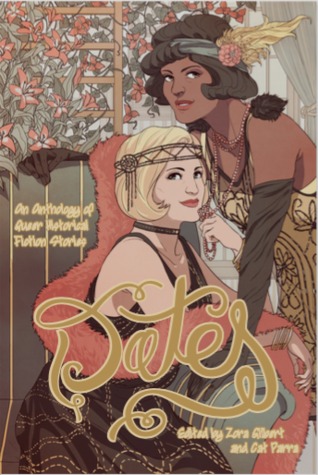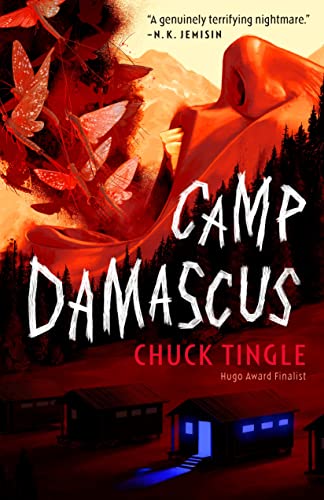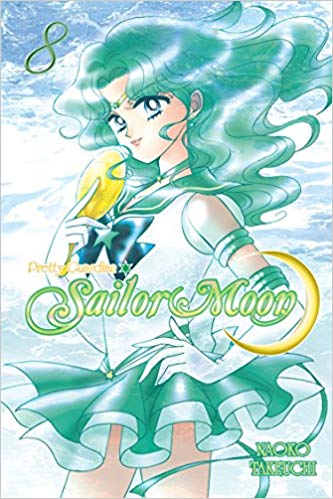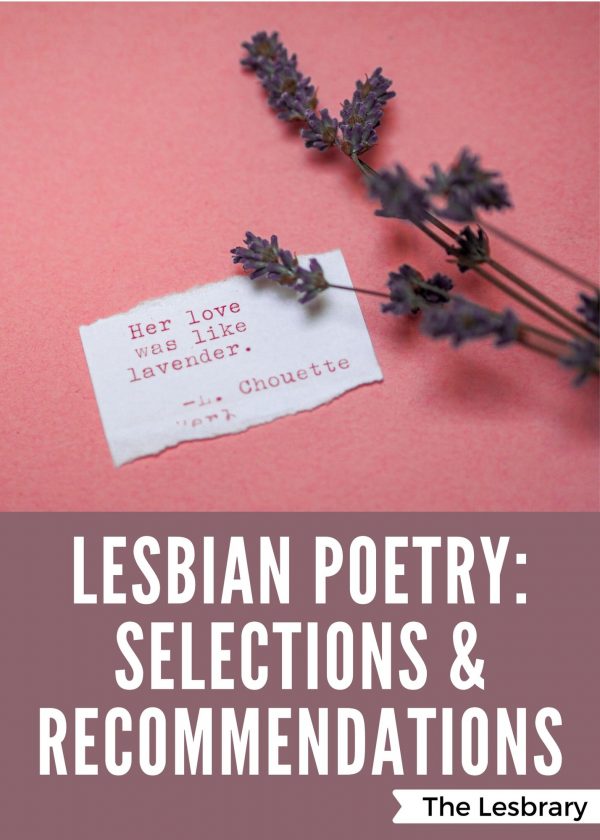
I’ve been researching the history of lesbian literature (as you do), and one of the things that I’ve learned is that lesbian poetry has been at the foundation of lesbian lit. Of course, Sappho is the one that started it all, though we have to make due with only fragments of her poetry, leaving us with tantalizing scraps of poems like:
and on a soft bed
delicate
you would let loose your longing
and neither any[ ]nor any
holy place nor
was there from which we were absent
no grove[ ]no dance
]no sound
[
One of the few (almost) complete poems we have still resonates today:
He seems to me equal to the gods that man
whoever he is who opposite you
sits and listens close
to your sweet speaking
and lovely laughing—oh it
puts the heart in my chest on wings
for when I look at you, even a moment, no speaking
is left in me
no: tongue breaks and thin
fire is racing under skin
and in eyes no sight and drumming
fills ears
and cold sweat holds me and shaking
grips me all, greener than grass
I am and dead—or almost
I seem to me.
But all is to be dared, because even a person of poverty . . .
(Both translated by Anne Carson in If Not, Winter: Fragments of Sappho)
Sappho is the foundation of queer women literature, including giving us the words lesbian and sapphic, but lesbian poetry books have in general been some of the first explicitly lesbian books published through time.
In the 1800s, Wu Tsao was a celebrated poet. Her poems were sung throughout China. And she was open about loving women. Among other topics, she wrote love poetry for courtesans, including this one:
For the Courtesan Ch’ing Lin
On your slender body
Your jade and coral girdle ornaments chime
Like those of a celestial companion
Come from the Green Jade City of Heaven.
One smile from you when we meet,
And I become speechless and forget every word.
For too long you have gathered flowers,
And leaned against the bamboos,
Your green sleeves growing cold,
In your deserted valley:
I can visualize you all alone,
A girl harboring her cryptic thoughts.
You glow like a perfumed lamp
In the gathering shadows.
We play wine games
And recite each other’s poems.
Then you sing `Remembering South of the River’
With its heart breaking verses. Then
We paint each other’s beautiful eyebrows.
I want to possess you completely –
Your jade body
And your promised heart.
It is Spring.
Vast mists cover the Five Lakes.
My dear, let me buy a red painted boat
And carry you away
(Translated by Kenneth Rexroth and Ling Chung in Women Poets of China)
In 1900 in France, Natalie Clifford Barney published Quelques Portraits-Sonnets de Femmes (Translated: Some Portrait-Sonnets of Women), a book of lesbian love poetry. When her father found out about this, he bought up the remaining stock of the title and had them burned.
A few years later, Renée Vivien (a lover of Barney’s) wrote and published her own lesbian poetry, chock-full of references to Sappho’s poems and not exactly subtextual in their content:
The Touch
The trees have kept some lingering sun in their branches,
Veiled like a woman, evoking another time,
The twilight passes, weeping. My fingers climb,
Trembling, provocative, the line of your haunches.
My ingenious fingers wait when they have found
The petal flesh beneath the robe they part.
How curious, complex, the touch, this subtle art–
As the dream of fragrance, the miracle of sound.
I follow slowly the graceful contours of your hips,
The curves of your shoulders, your neck, your unappeased breasts.
In your white voluptuousness my desire rests,
Swooning, refusing itself the kisses of your lips.
(The Muse of the Violets: Poems by Renée Vivien)
In 1923, the U.S. got its first book of lesbian poetry: On A Grey Thread by Elsa Gidlow. I’m including one from her later collection, Sapphic Songs:
For the Goddess Too Well Known
I have robbed the garrulous streets,
Thieved a fair girl from their blight,
I have stolen her for a sacrifice
That I shall make to this night.
I have brought her, laughing,
To my quietly dreaming garden.
For what will be done there
I ask no man pardon.
I brush the rouge from her cheeks,
Clean the black kohl from the rims
Of her eyes; loose her hair;
Uncover the glimmering, shy limbs.
I break wild roses, scatter them over her.
The thorns between us sting like love’s pain.
Her flesh, bitter and salt to my tongue,
I taste with endless kisses and taste again.
At dawn I leave her
Asleep in my wakening garden.
(For what was done there
I ask no man pardon.)
I can’t detail the entire history of lesbian poetry here, so I will skip to one of the biggest names: Audre Lorde, who has written incredible things about race, sexuality, and sexism, and casually includes lines like “And there is, for me, no difference between writing a good poem and moving into sunlight against the body of a woman I love” (Uses of the Erotic: The Erotic as Power).
Love Poem
Speak earth and bless me with what is richest
make sky flow honey out of my hips
rigid as mountains
spread over a valley
carved out by the mouth of rain.
And I knew when I entered her I was
high wind in her forests hollow
fingers whispering sound
honey flowed
from the split cup
impaled on a lance of tongues
on the tips of her breasts on her navel
and my breath
howling into her entrances
through lungs of pain.
Greedy as herring-gulls
or a child
I swing out over the earth
over and over
again.
(The Collected Poems of Audre Lorde)
A contemporary of Lorde’s who isn’t as well known is Pat Parker, who was another black lesbian feminist poet writing in the ’70s. I can’t help but include this one :
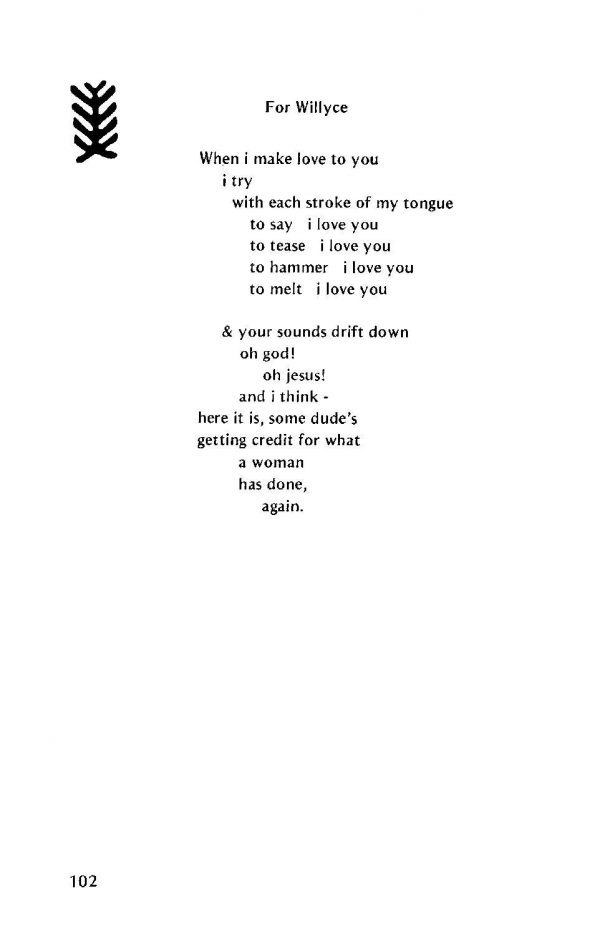
[image description: a Pat Parker poem titled “For Willyce.” It reads: “When i make love to you / i try / with each stroke of my tongue/ to say i love you / to tease i love you / to hammer i love you / to melt i love you // & your sounds drift down / oh god! / oh jesus! / and I think – / here it is, some dude’s / getting credit for what / a woman / has done, / again.”]
(Pit Stop by Pat Parker)
Of course, lesbian poetry isn’t just a thing of the past. Recently, Julie R. Enszer’s collection Sisterhood left me completely shaken with this poem:
Zyklon B
Where should one draw the line?
…the line is very clearly Zyklon B.
The painters call before we move into the new house. Ma’am, they say—
I am not old enough to be a ma’am, but I don’t correct them—
Ma’am, they say, we smell gas.
I dismiss their concern. I say, Keep painting.
I say, You are already two weeks behind schedule.
Five days after we move in, I wake up sick. I vomit.
Gas filled our house. We open all the windows,
call the utility company. The stove regulator isn’t working.
It can’t be fixed. We buy a new Frigidaire.
This is what I know of life:
Love fiercely, even recklessly;
Laugh loudly, even raucously;
Risk everything, at least once;
Live openly, without abandon;
Build trust, be honest;
Buy American.
A year later our washing machine breaks.
I want a new German one—small, sleek, stylish.
I tell my wife, It is perfect for the kitchen.
Our washer and dryer are in the kitchen.
My wife says, They built the ovens.
We buy a new Frigidaire.
Degesch, a company affiliated with Degussa,
based in Dusseldorf,
is the world’s largest maker of specialty chemicals.
Degussa has an exemplary record
of examining the wartime past,
making restitution to victims. Still
The Memorial Foundation for the Murdered Jews of Europe
rejects a subcontract for Degussa.
Degesch manufactured gas pellets: Zyklon B.
This is what I know of gas:
May you never make a mistake that cannot be corrected.
May you never take an action that cannot be forgotten.
If you’re looking for coming out poetry, the tiny book When I Was Straight by Julie Marie Wade would be up your alley. It is divided into two sections: “When I Was Straight” and “After.”
When I Was Straight
I did not love women as I do now.
I loved them with my eyes closed, my back turned.
I loved them silent, & startled, & shy.
The world was a dreamless slumber party,
sleeping bags like straitjackets spread out on
the living room floor, my face pressed into a
slender pillow.
All night I woke to rain on the strangers’ windows.
No one remembered to leave a light on in the hall.
Someone’s father seemed always to be shaving.
When I stood up, I tried to tiptoe
around the sleeping bodies, their long hair
speckled with confetti, their faces blanched by the
porch-light moon.
I never knew exactly where the bathroom was.
I tried to wake the host girl to ask her, but she was
only one adrift in that sea of bodies. I was ashamed
to say they all looked the same to me, beautiful &
untouchable as stars. It would be years before
I learned to find anyone in the sumptuous,
terrifying dark.
This, of course, does not begin to scratch the surface in highlighting amazing lesbian poetry! Feel free to comment with of your favorites that I missed.
Some great resources for discovering more authors are: this list of LBT+ Women & Non-Binary Contemporary Poets (and if you are looking for other queer women poets, I can’t recommend Leah Lakshmi-Piepzna Samarasinha highly enough!), looking at the Lambda Literary Awards winner (and nominees) for the Lesbian Poetry category, and the Goodreads list of Best Lesbian Poetry.
Probably the easiest way, though, is to try some lesbian poetry/literature anthologies, like Inseparable: Desire Between Women in Literature by Emma Donoghue, Chloe Plus Olivia: An Anthology of Lesbian Literature from the Seventeenth Century to the Present by Lillian Faderman, or My Lover Is a Woman: Contemporary Lesbian Love Poems edited by Lesléa Newman, and follow up on the poets who appeal to you!
Looking for more sapphic poetry? Check out 10 Poetry Collections by Black Queer Women and the Poetry tag.
This post originally ran on Book Riot.
Support the Lesbrary on Patreon at $2 or more a month and be entered to win a queer women book every month! $5 and up patrons get guaranteed books throughout the year on top of the giveaways!
